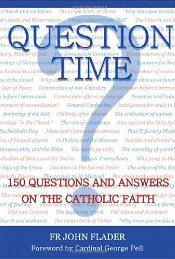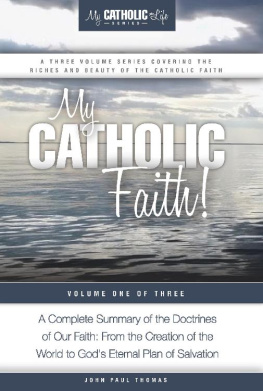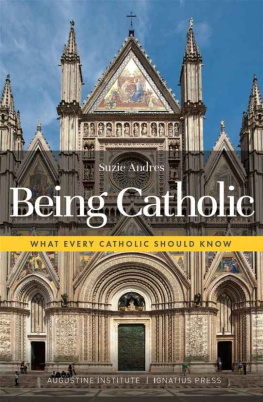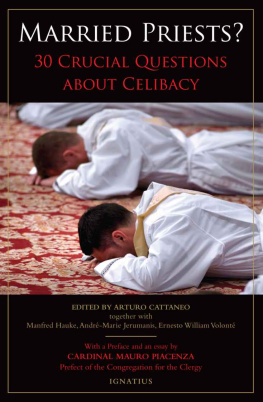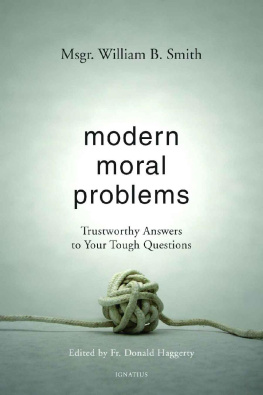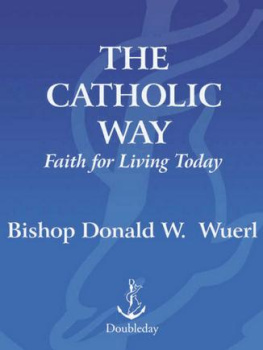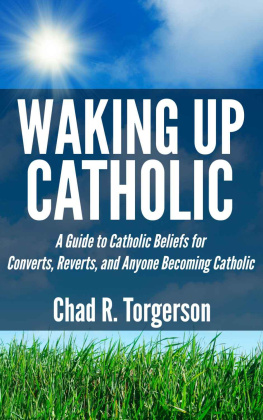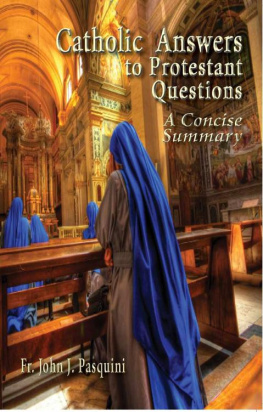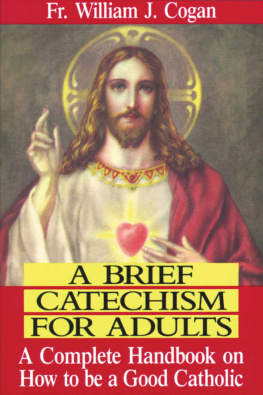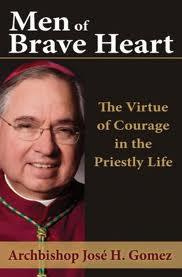
QUESTION TIME
150 Questions and Answers on the Catholic Faith
Fr. John Flader
In memory of St Josemara Escriv,
who taught me love for the Church.
This edition of Question Time is printed in 2009 by Sinag-tala Publishers Makati City, Philippines.
Nihil Obstat: Rev. Peter Joseph, STD
Imprimatur: +George Cardinal Pell Archbishop of Sydney
29 th February 2008
The Scripture quotations are from the New Revised Standard Version of the Bible, copyrighted, 1989, by the Division of Christian Education of the National Council of Churches in the United States of America, and are used with permission. All rights reserved.
ISBN 971 554 209 8
The publisher gratefully acknowledge the kind permission of Connor Court Publishing Pty Ltd, PO BOX 1, BALLAN VIC, Australia to publish QUESTION TIME for the Philippine Market.
First published 2008 Connor Court Publishing Pty Ltd
Copyright 2008 John Flader
All rights reserved.
Contents
Chapter 1 - Catholic Doctrine
God and Creation
Jesus Christ
The Church and Salvation
The Last Things
The Blessed Virgin Mary
Chapter 2 - The Sacraments and Sacramentals
Baptism and Confirmation
The Real Presence in the Eucharist
The Mass
Holy Communion
Penance and Indulgences
Anointing of the Sick
Marriage
Holy Orders
Sacramentals
Chapter 3 - Christian Moral Issues
General moral questions
Relations with God
Relations with our neighbour
Chapter 4 - Christian Prayer and Devotions
Christian Prayer
Devotion to Jesus, Mary and the Saints
Liturgical Seasons and Feasts
Foreword
CONTRARY TO SOME STEREOTYPES in our society, the life of the Christian is one of constant reflection and questioning. The more we learn about God, the more we read the Bible, the more we puzzle over problems in our daily lives and in our societies which seem to challenge Christian beliefs and Catholic teachings, the more questions we have. Praying and meditating regularly also gives rise to many questions as we ponder God's mercy and love, his promises to us, and the evil and suffering that frequently confront us in our daily lives.
Father John Flader's book Question Time - 150 Questions and Answers on the Catholic Faith is a wonderful resource for every Catholic who has ever had questions about the faith or about our life together with God. This book brings together answers from Fr. Flader's popular column in The Catholic Weekly and reflects the timelessness and fascination that different questions have for Christians of all ages and across all generations. The ground covered in this book is nothing if not wide ranging. Can we hurt God? What does the Church think about Evolution? Did the children of Adam and Eve commit incest? Is everyone saved? What does infallibility mean? Does limbo exist? What is an indulgence?
Fr. Flader also covers important questions about the life and teaching of Jesus, the sacraments of the Church, the Mass, Mary, and prayer. Moral problems such as suicide, the death penalty, homosexuality, and gambling are also discussed.
Question Time will be a much referenced resource for everyone who uses it. Different questions at different times of the year and at different times in our lives will bring readers back to it again and again. In its succinct and elegant explanations of Catholic teaching and belief, Catholics will find information, encouragement, reassurance, and clarity. They will probably also find some new questions to ask.
Fr. Flader has done us all an enormous service in collating his columns and in bringing them to print in this book. I have enjoyed reading it and learnt much from it and I hope you do too.
+George Cardinal Pell
ARCHBISHOP OF SYDNEY
March, 2008
Introduction
SOON AFTER BEGINNING to write the Question Time column for The Catholic Weekly, I began to receive reports of people who were cutting out the columns and pasting them on paper for future reference, or photocopying them for others. Over the years numerous people have asked if there was any plan to publish the columns as a book.
Now that three years have passed, the time has come to satisfy the desires of these people and to publish the first 150 columns.
The questions and answers are arranged systematically by topic, following the general structure of the Catechism of the Catholic Church. Chapter 1 deals with matters of Catholic doctrine, Chapter 2 with questions relating to the sacraments and sacramentals, Chapter 3 with matters of moral life in Christ, and Chapter 4 with questions relating to prayer and Christian devotions.
I am indebted especially to Joanne Lucas, who read most of the columns before they were sent to the Catholic Weekly and made helpful comments on their style and content. Also to Fr Peter Joseph and Fr Edward Barry, who made valuable suggestions to improve the final draft.
I am also grateful to Anthony Cappello of Connor Court Publishing, who graciously offered to publish the book.
I pray that Question Time will help those who read it to understand their faith better and to come to a deeper love for Jesus Christ, Our Lady and the Church.
Deo omnis gloria! Fr John Flader
Chapter One
Catholic Doctrine
God and Creation
1. The question of the "filioque"
From time to time I have heard people speak of the question of the "filioque", which has something to do with the Creed. Can you please explain what this is?
The word filioque is Latin for "and the Son". It appears, as you mention, in the Creed we say in Mass on Sundays when we profess our faith in the Holy Spirit, "who proceeds from the Father and the Son."It is good that all Catholics be acquainted with the background to this question.
As we know, the Creed is the formula of faith agreed upon in the first two Ecumenical Councils. The first two parts, relating to God the Father and God the Son, came from the Council of Nicaea in 325 AD and the last part, on the divinity of the Holy Spirit, from the Council of Constantinople in 381 AD.
The formula agreed upon by both Eastern and Western fathers at the Council of Constantinople stated that the Holy Spirit "proceeds from the Father". In 451 AD, the Council of Chalcedon, again attended by both Eastern and Western fathers, formally recognised and received the profession of faith of Nicaea and Constantinople, stating that the Holy Spirit "proceeds from the Father".
However, Pope St Leo the Great, following an ancient Latin and Alexandrian tradition, had professed dogmatically in 447 AD that the Holy Spirit proceeds from the Father "and the Son".
In 649 Pope Martin I used the phrase "and the Son" in a letter to the Church in Constantinople, causing upset that was diminished by St Maximus the Confessor, one of the great Eastern Fathers of the Church. Later, when Charlemagne introduced "and the Son" into the Creed early in the ninth century, Pope Leo III asked the Emperor to drop the phrase.
Nonetheless, the words "and the Son" were gradually introduced into the Creed in country after country of Europe between the eighth and eleventh centuries. The phrase was finally inserted into the Creed even in Rome around 1013. It was one of the arguments used against the Western Church by the Easterns at the time of the split in 1054. The Council of Florence in 1439, attended by both Eastern and Western fathers, discussed the question in 14 sessions and finally defined that "the filioque was added to the Creed licitly and reasonably to expound the truth, and under the spur of necessity."

